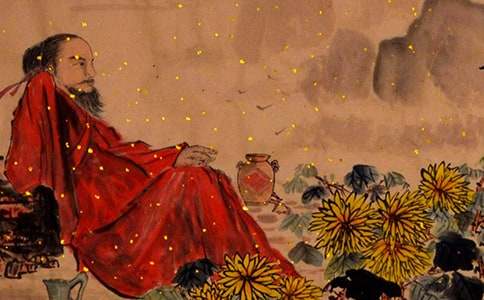陶渊明《归去来兮辞》的两种译文比较
引导语:《归去来兮辞》是陶渊明辞官归隐之际与上流社会公开决裂的政治宣言,下面是收集的《归去来兮辞》原文的两种译文比较,我们一起阅读学习其中的知识吧。

一、 关于陶渊明
陶渊明是汉魏南北朝800年间最杰出的诗人,也是杰出的辞赋家与散文家。陶诗今存125首,计四言诗9首,五言诗116首。陶文今存12篇,计有辞 赋3篇、韵文5篇、散文4篇。
陶渊明的文学对后代文学产生了巨大的影响。李白更是仰慕陶渊明的人品和诗作。在《戏赠郑溧阳》中写道: 陶令日日醉,不知五柳春。素琴本无弦,漉酒用葛巾。清风北窗下,自谓羲皇人。何时到栗里,一见平生亲。李白那种“安能摧眉折腰事权贵”的思想,和陶渊明“不为五斗米折腰”的精神,是一脉相承的。杜甫在安史之乱之后,过着颠沛流离的生活,把陶渊明引为知己,他在《奉寄河南韦尹丈人》中写道: 宽心应是酒,谴兴莫过诗。此意陶潜解,吾生后汝期。
《归去来兮辞》是陶渊明辞官归隐之际与上流社会公开决裂的政治宣言。文章以绝大篇幅写了他脱离官场的无限喜悦,想象归隐田园后的无限乐趣,表现了作者对大自然和隐居生活的向往和热爱。文章将叙事、议论、抒情巧妙地融为一体,创造出生动自然、引人入胜的艺术境界;语言自然朴实,洗尽铅华,带有浓厚的乡土气息。
随着中外文化交流日益加深,越来越多的中国优秀文章被翻译成英文。陶渊明的《归去来兮辞》也被译成不同版本。很出名的译本有林语堂对《归去来兮辞》的英译。这些不同的译本对原文有着各自独特的诠释,对这些译文进行比较式非常有意义的。这里收集了林语堂及另一匿名译者的译文并对这两篇译文进行对比。
二、陶渊明《归去来兮辞》原文
归去来兮,田园将芜胡不归!既自以心为形役,奚惆怅而独悲?悟已往之不谏,知来者之可追。实迷途其未远,觉今是而昨非。舟遥遥以轻飏,风飘飘而吹衣。问征夫以前路,恨晨光之熹微。 译文对比
乃瞻衡宇,载欣载奔。僮仆欢迎,稚子候门。三径就荒,松菊犹存。携幼入室,有酒盈樽。引壶觞以自酌,眄庭柯以怡颜。倚南窗以寄傲,审容膝之易安。园日涉以成趣,门虽设而常关。策扶老以流憩,时矫首而遐观。云无心以出岫,鸟倦飞而知还。景翳翳以将入,抚孤松而盘桓。
归去来兮,请息交以绝遊。世与我而相违,复驾言兮焉求?悦亲戚之情话,乐琴书以消忧。农人告余以春及,将有事于西畴。或命巾车,或棹孤舟。既窈窕以寻壑,亦崎岖而经邱。木欣欣以向荣,泉涓涓而始流。善万物之得时,感吾生之行休。
已矣乎!寓形宇内复几时!曷不委心任去留?胡为乎遑遑欲何之?富贵非吾愿,帝乡不可期。怀良辰以孤往,或植杖而耘耔。登东皋以舒啸,临清流而赋诗。聊乘化以归尽,乐天天命复奚疑!
归去来兮辞翻译大意:
回去吧,家里的田园就要荒芜了,为什么你还不回去呢!既然自己觉得自己是一个放浪形骸之外的人,为什么还肚子惆怅忧伤呢?明明知道自己的过去的错误已经不能够再挽回了,未来的事情还是有自己把握的。自己已经认识到自己误入歧途的还不太远,知道自己所做的事今天是对的,以前的是错的。
归去的小船摇摇荡荡的开启了,徐徐的风吹动着衣服。向人打听前面的道路,可恨的是早晨的阳光还是那么的微弱。抬起头来看到家乡的屋檐,满载欣喜的往回走。有年幼的仆人已经在门上欢迎了,幼小的儿子已经在门上等候多时。虽然庭院的小路上已经有了荒芜之相,但是松树和菊花还存在。我拉着我的孩子进入内屋,桌子上已经摆上了酒菜,拿起酒杯自斟自饮,看着庭院中的树木我很开心。靠在向南的窗户上,抒发我的傲视情怀,看着自己身居的简陋住所反而让我心更加安宁。每天能够在院子里散步已经成为乐趣,院子的门虽然设着但是经常关着。扶着手杖悠闲的漫步和休息,不时的抬头看看远处的天空,看到云烟从山洞飘出,鸟儿飞累了回去住的地方。太阳渐渐要落山了,我扶着孤松而不愿意离开。
回去吧,请不要再和我交游了,世俗已经和我的看法想韦博,我还驾车出游有什么意思呢?亲人之间说说话能够心情愉悦,可以玩弄琴棋书画来消除忧愁。农人告诉我春天来了,我要到西面的耕地里去种植。有的.人驾着篷布车,有的人划着小船。看到农民时而沿着曲折的小溪进入山谷,时而沿着崎岖的小路走上山丘。树木长的欣欣向荣,泉水永不停息的奔流着。我羡慕世界万物生得逢天时,感慨我自己的事业生涯就到这里终止了。
算了吧!寄身于天地间还有多少时日!何不放下心来听凭生死?为什么还要遑遑不安想去哪里?企求富贵不是我的心愿,寻觅仙境不可期冀。只盼好天气我独自外出,或者将手杖插在田边去除草培苗。登上东边的高岗放声长啸,面对清清的流水吟诵诗篇。姑且随着大自然的变化走向生命的尽头,乐天安命还有什么值得怀疑!
译文1:林语堂译文
Ah, homeward bound I go!
Why not go home, seeing that my field and gardens are overgrown?
Myself have made my soul serf to my body: why have vain regrets and mourn alone?
Fret not over bygones
and the forward journey take. Only a short distance have I gone astray,
and I know today I am right,
if yesterday was a complete mistake.
floats and drifts the boat,
and gently flows and flaps my gown. I inquire the road of a wayfarer,
and sulk at the dimness of the dawn.
Then when I catch sight of my old roofs,
joy will my steps quicken.
Servants will be there to bid me welcome,
and waiting at the door are the greeting children.
Lightly o seed, perhaps, are my garden paths,
but there will still be the chrysanthemums and the pine!
I shall lead the youngest boy in by the hand,
Gone tand on the table there stands a cup full of wine! Holding the pot and cup, I give myself a drink,
happy to see in the courtyard the hanging bough.
I lean upon the southern window with an immense satisfaction, and note that the little place is cosy enough to walk around.
The garden grows more familiar and interesting with the daily walks.
What if no one knocks at the always closed door!
Carrying a cane I wander at peace, and now and then look aloft to gaze at the blue above.
There the clouds idle away from their mountain recesses
without any intent or purpose, and birds, when tired of their wandering flights,
will think of home.
Darkly then fall the shadows and, ready to come home,
I yet fondle the lonely pines and loiter around.
Ah, homeward bound I go!
Let me from now on learn to live alone! The world and I are not made for one another,
and why go round like one looking for what he has not found?
Content shall I be with conversations with my own kin, and there will be music and books
to while away the hours.
The farmers will come and tell me that spring is here and there will be work to do at the western farm.
Some order covered wagons; some row in small boats.
Sometimes we explore quiet, unknown ponds,
and sometimes we climb over steep, rugged mounds.
There the trees, happy of heart, grow marvelously green,
and spring water gushes forth with a gurgling sound.
I admire how things grow and prosper according to their seasons,
and feel that thus, too, shall my life go its round.
Enough!
How long yet shall I this mortal shape keep?
Why not take life as it comes, and why hustle and bustle like one on an errand bound?
Wealth and power are not my ambitions,
and unattainable is the abode of the gods!
I would go forth alone on a bright morning,
or perhaps, planting my cane, begin to pluck the weeds and till the ground.
Or I would compose a poem beside a clear stream,
or perhaps go up to Tungkao
and make a long-drawn call on top of the hill.
So would I be content to live and die,
and without questionings of the heart,
gladly accept Heaven's will.